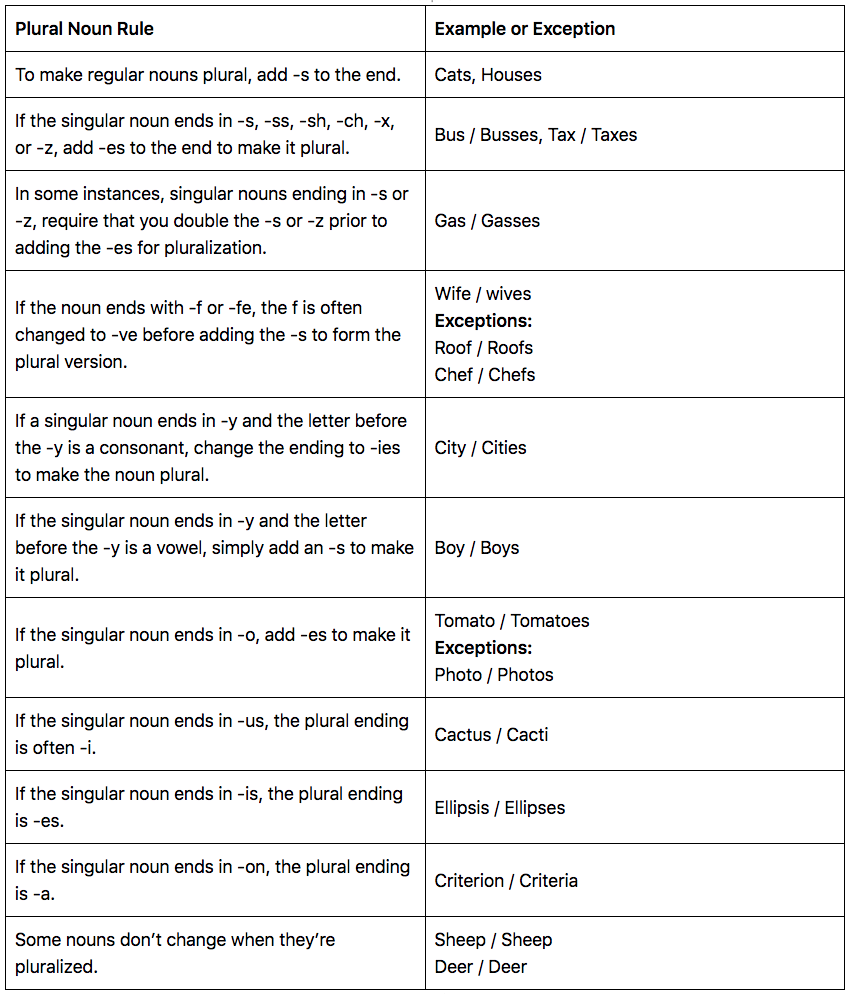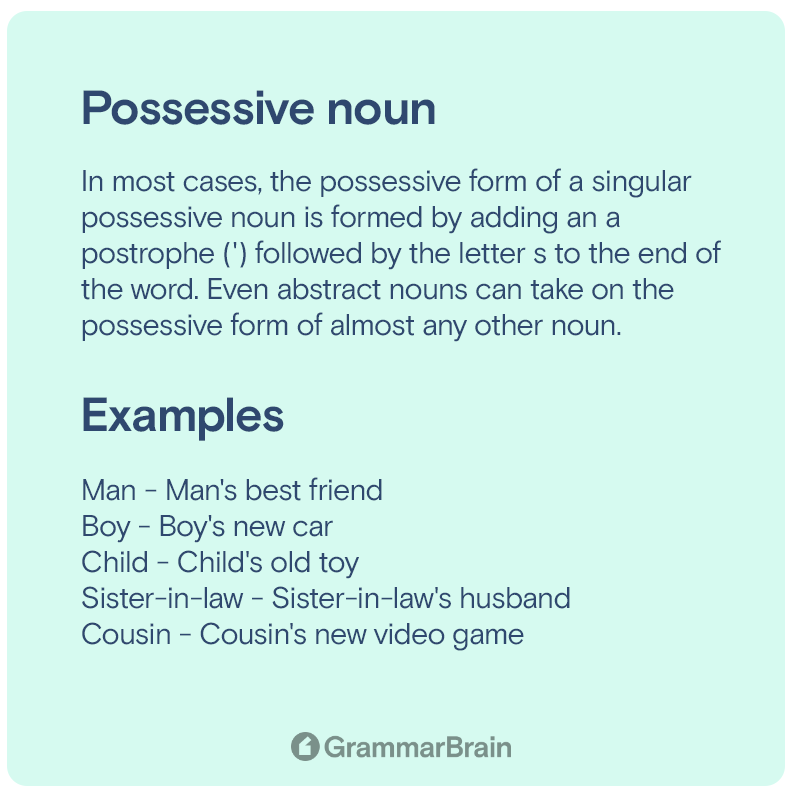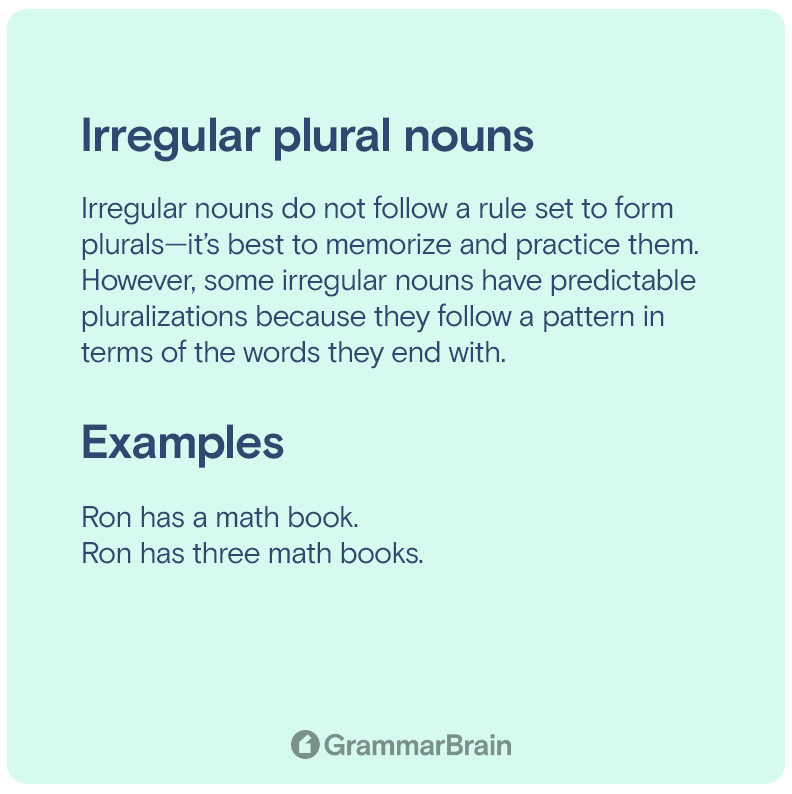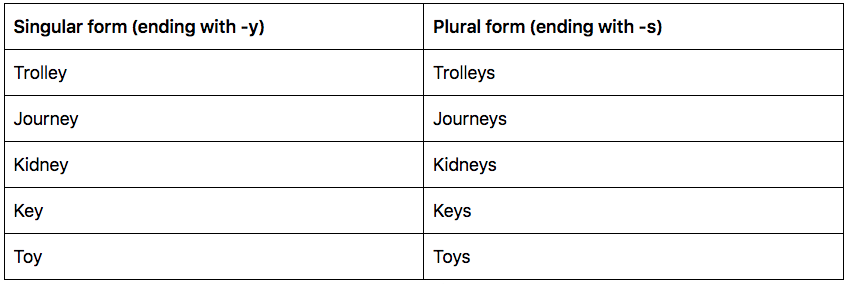What is a plural noun? In English, there are two forms of nouns: singular and plural (with many types of nouns that follow it). The singular form of a noun is used to refer to one item. For example: a book. The plural form is used to refer to two or more objects. For example: two books. As we refer to the noun “book,” we add a -S to it to make sure that it signifies we are speaking about multiple objects (or multiple nouns).
Let’s jump in to learn more about plural nouns…
What is a Plural Noun?
A plural noun is a noun if it refers to two or more individuals, entities, things, or concepts. There are many exceptions, but most plural nouns end in -s or -es, making them easy to identify.
Particularly, irregular plural nouns have unique plural forms for each word form, such as the words child and children for the plural form

What is a Singular Noun?
Singular nouns refer to one place, person, or thing. For example, when we refer to a “book,” this is a singular noun.
Since we are referring to one single book, which is an object, it makes it both a singular and a noun.
What’s the Difference Between Singular and Plural Nouns?
Luckily, it’s easy to comprehend the difference. The confusion often subsides in the way the word forms are put together and how the word ends are altered to create the plural noun form.
The key difference is that we are referring to more than one person, object, thing, or place.
What is a Plural Possessive Noun?
A plural possessive noun is still a plural noun, although it contains an apostrophe. The apostrophe is used to show possession.
For example, “boss” and “bosses’.” Take the following sentence, “We went to my bosses’ house.”
In this example, we add the apostrophe to the plural possessive noun “boss” in order to show possession to the home (or house). Plural possessive nouns are typically paired with a verb or adverb. Modifying the possession of the sentence subject.
From our example, the sentence subject would be “the house.”

What is an Irregular Plural Noun?
Regular and irregular plural nouns both serve the same function—indicating more than one name, place, animal, or thing, depending on the referred noun.
E.g. One tree, many trees. One fox, many foxes. One cake, many cakes.
Regular and irregular nouns can coexist in the same sentence in both singular and plural forms and still make sense. It’s important, though, to use the correct endings for each of these nouns.
For example, Ron had two pencils and one pen in his school bag. He had five books on each of his bookshelves.
Here, pen and school bag are singular nouns, pencils and books are regular plural nouns, and bookshelves is an irregular plural noun.
- Pencils have a -s at the end, indicating that there is more than one of them (in our case, two pencils).
- Bookshelves have a-ves at the end instead of a -f, indicating that there is more than one bookshelf.

Rules for the Formation of Plural Nouns:
In order not to get confused in the intricacies of the formation of plural nouns, it is enough to remember the basic rule. Well, then, there is nothing more important in learning a language than practicing speaking it.
The basic rule for plural formation is adding the ending -s to the word.
For example:
- A monkey – monkeys (monkey – monkeys)
- A lion – lions (lion – lions)
- A cucumber – cucumbers (cucumber – cucumbers)
But it happens that just adding -S does not work for all plural nouns. This is because there is difficulty of the pronunciation the word and overall clarity of the sentence subject. Take the word glass – try adding -ES: glasses.
If you pronounce it, you can’t hear the difference between the word glass in the singular and glasses in the plural form. This is an example of how pronunciation and writing can sometimes differ.
In these cases, you need to add the ending “ES”
- A glass – glasses
- A potato – potatoes
- A brush – brushes
- A bus – buses
- A watch – watches
- A box – boxes
Plural Noun Examples of Words Ending In “O”
Some words ending in -O have plural noun grammar exceptions. And we only add the letter -s:
- A radio – radios
- A video – videos
- A hippo – hippos
- A photo – photos
- A rhino – rhinos
- A piano – pianos
Plural Noun Examples of Words Ending In “F” or “EF”
The letter “F” is distinguished from other plural noun rules. When the word ends in -f / -ef, then in the plural, you need to change the ending to -ves (pronounce [vz]):
- A scarf – scarves
- A leaf – leaves
- A thief – thieves
- A shelf – shelves
Plural Noun Examples of Words Ending In “Y”
If nouns end in a consonant sound, then the plural word will look like this: we remove -y, and instead write -ies (while pronouncing the sound [z]):
- A lorry – lorries
- A baby – babies
Examples of Exceptions to the Pluralization of English Nouns:
There are many exception words in American English. And it can get confusing. If you just started learning the English language, you don’t need to memorize all of them. For first time English speakers, learning the basics of plural nouns can be sufficient in comprehending basic sentences and writing formally.
Let’s start with a few of the plural noun exceptions that change the word entirely:
- A man – men
- A woman – women
- A foot – feet
- A mouse – mice
- A tooth – teeth
- A goose – geese
- A child – children
- An ox – oxen
Words that Stay the Same in Singular and Plural Form:
Words like deer, sheep, hair, apparatus, series, species, heathen, and cannon
These are those words in English that remain the same in both singular and plural. The adjectives or articles used before them indicate whether they are singular or plural.
- A swine – swine
- A deer – deer
- A sheep – sheep
- A trout – trout
- A species – species
For Example:
Always Plural Word Forms:
Most commonly, plural verbs will get used alongside these words. Although, these words will always stay in their plural form and never change.
- Antipodes
- Alms
- Assets
- Arms
- Ashes
- Auspicious
- Billiards
- Bellows
- Bowels
- Measles
- Tidings
- Riches
- Scissors
- Scales
- Cards
- Credentials
Examples of Visible Singular Plural Nouns:
Some collective nouns like folk, cattle, mankind, police, peasantry, public, people, cavalry, vermin, gentry, infantry, majority, tenantry, and bulk look singular but they are plural.
A plural verb will be used alongside these noun forms.
For example:
- Cattle are grazing in the field.
- The police are coming.
Grammar Rules of Plural Nouns (And Irregular, Regular, or Singular)
Rule #1: For nouns ending with -f, replace -f with -ves
To form plurals of nouns ending with the letter -f, replace -f with -ves at the end of the word.
Similarly, to form plurals of nouns ending with the letters -fe, replace -fe with -ves at the end of the word.
Below are some irregular nouns that follow this rule.
| Singular form (ending with -f) | Plural form (ending with -ves) |
| Wolf | Wolves |
| Leaf | Leaves |
| Calf | Calves |
| Loaf | Loaves |
| Shelf | Shelves |
| Half | Halves |
| Self | Selves |
| Thief | Thieves |
| Elf | Elves |
| Bookshelf | Bookshelves |
| Interleaf | Interleaves |
| Underleaf | Underleaves |
| Werewolf | Werewolves |
Example 1:
A: He had treasured his grandmother’s clothes on the blue shelf.
B: He had treasured his grandmother’s clothes on the blue shelves.
In example A, the singular form, shelf, is mentioned. In example B, the plural form of shelf—shelves—is mentioned.
Example 2:
A: The thief escaped from the room.
B: The thieves escaped from the room.
In example A, the singular form, thief, is mentioned. In example B, the plural form of thief—thieves—is mentioned.
Rule #2: For nouns ending in -o, add -es at the end of the noun.
| Singular form (ending with -o) | Plural form (ending with -es) |
| Mango | Mangoes |
| Tornado | Tornadoes |
| Domino | Dominoes |
| Potato | Potatoes |
| Tomato | Tomatoes |
| Hero | Heroes |
| Zero | Zeroes |
| Mosquito | Mosquitoes |
| Echo | Echoes |
| Buffalo | Buffaloes |
Example 1:
A: A mosquito troubled an elephant in the jungle.
B: The mosquitoes troubled an elephant in the jungle.
In example A, the singular form, mosquito, is mentioned. In example B, the plural form of mosquito—mosquitoes—is mentioned.
Example 2:
A: Patrick heard the echo of an old woman in the church.
B: Patrick heard echoes of an old woman in the church.
In example A, the singular form, echo, is mentioned. In example B, the plural form of echo—echoes—is mentioned.
Rule #3 For nouns ending in -y form plural by replacing -y with -ies
| Singular form (ending with -y) | Plural form (ending with -ies) |
| Lady | Ladies |
| Candy | Candies |
| Enemy | Enemies |
| Body | Bodies |
| Strawberry | Strawberries |
| Pony | Ponies |
| Puppy | Puppies |
| Story | Stories |
| Baby | Babies |
| Army | Armies |
| Firefly | Fireflies |
| Lorry | Lorries |
| Bunny | Bunnies |
| Fairy | Fairies |
Example 1:
A: At night, Rachel dreamt of a fairy who would take her to a fairyland.
B: At night, Rachel dreamt of fairies who would take her to a fairyland.
In example A, the singular form, fairy, is mentioned. In example B, the plural form of fairy—fairies—is mentioned.
Example 2:
A: By evening, the army proceeded toward the base camp.
B: By evening, the armies proceeded toward the base camp.
In example A, the singular form, army, is mentioned. In example B, the plural form of army—armies—is mentioned.
Rule #4: For nouns with changing vowels
| Singular form | Plural form |
| Man | Men |
| Woman | Women |
| Goose | Geese |
| Foot | Feet |
| Tooth | Teeth |
Example 1:
A: Mike’s tooth ached terribly after eating jelly candies.
B: Mike’s teeth ached terribly after eating jelly candies.
In example A, tooth is an irregular noun in the singular form. To form the plural of tooth, the vowels of the noun are changed. So, -oo becomes -ee. In example B, teeth is an irregular plural noun.
Example 2:
A: There is a woman waiting in the office, asking for Mr. Ben.
B: There are women waiting in the office, asking for Mr. Ben.
In example A, woman is an irregular noun in singular form. To form the plural of woman, the vowel of the noun is changed.* So, -a becomes -e. In example B, women is an irregular plural noun.
*woman has two vowels—o and a—but only a is changed in the plural form.
Rule # 5: For Nouns that change dramatically
The plural form of such nouns is difficult to predict because it does not follow a specific pattern. When in doubt, look up the word in the dictionary.
| Singular form | Plural form |
| Person | People |
| Mouse | Mice |
| Child | Children |
| Ox | Oxen |
| Die | Dice |
| Louse | Lice |
Example 1:
A: She is the child of God.
B: They are the children of God.
In example A, child is an irregular noun in singular form. The plural form of child is stated in example B, i.e., children.
Example 2:
A: Matt had an ox and a hen in his farm.
B: Matt had oxen and hens in his farm.
In example A, ox is an irregular noun in the singular form. The plural form of ox is stated in example B, i.e., oxen.
Rule #6 For nouns that remain unchanged
| Singular form | Plural form |
| Shrimp | Shrimp |
| Wheat | Wheat |
| Sheep | Sheep |
| Bison | Bison |
| Fish | Fish |
| Aircraft | Aircraft |
| Hair | Hair |
| Trout | Trout |
| Swine | Swine |
| Spacecraft | Spacecraft |
| Elk | Elk |
| Moose | Moose |
Example 1:
A: Uncle Vernon ate a tasty shrimp for dinner.
B: Uncle Vernon ate a plate full of tasty shrimp for dinner.
In example A, shrimp is an irregular noun. In example B, the plural form of shrimp is also shrimp. Here, the singular and plural forms of the irregular noun are the same.
Example 2:
A: The engineer designed the prototype for a spacecraft and submitted it to NASA.
B: The engineer designed the prototype for the spacecraft and submitted them to NASA.
In example A, spacecraft is an irregular noun. In example B, the plural form of spacecraft is also spacecraft. Here, the singular and plural forms of the irregular noun are the same.
| Singular form (ending with -y) | Plural form (ending with -s) |
| Trolley | Trolleys |
| Journey | Journeys |
| Kidney | Kidneys |
| Key | Keys |
| Toy | Toys |

FAQs
Which nouns do not have a plural form?
Did you know that not all words can be pluralized? Words that are used only in the singular are called uncountable, i.e. the ones we can’t count. For example, milk. You wouldn’t say one milk, two milks. No, you can only count milk in something, in packages, glasses: one package of milk, two glasses of milk.
How are nouns pluralized?
The primary way to form the plural of nouns is to add the ending -s or -es to the singular form of the noun. Nouns ending in -y with a preceding consonant are pluralized by adding -es, and changing -y to -i.
Inside this article
Fact checked:
Content is rigorously reviewed by a team of qualified and experienced fact checkers. Fact checkers review articles for factual accuracy, relevance, and timeliness. Learn more.
Core lessons
Glossary
- Abstract Noun
- Accusative Case
- Anecdote
- Antonym
- Active Sentence
- Adverb
- Adjective
- Allegory
- Alliteration
- Adjective Clause
- Adjective Phrase
- Ampersand
- Anastrophe
- Adverbial Clause
- Appositive Phrase
- Clause
- Compound Adjective
- Complex Sentence
- Compound Words
- Compound Predicate
- Common Noun
- Comparative Adjective
- Comparative and Superlative
- Compound Noun
- Compound Subject
- Compound Sentence
- Copular Verb
- Collective Noun
- Colloquialism
- Conciseness
- Consonance
- Conditional
- Concrete Noun
- Conjunction
- Conjugation
- Conditional Sentence
- Comma Splice
- Correlative Conjunction
- Coordinating Conjunction
- Coordinate Adjective
- Cumulative Adjective
- Dative Case
- Determiner
- Declarative Sentence
- Declarative Statement
- Direct Object Pronoun
- Direct Object
- Diction
- Diphthong
- Dangling Modifier
- Demonstrative Pronoun
- Demonstrative Adjective
- Direct Characterization
- Definite Article
- Doublespeak
- False Dilemma Fallacy
- Future Perfect Progressive
- Future Simple
- Future Perfect Continuous
- Future Perfect
- First Conditional
- Irregular Adjective
- Irregular Verb
- Imperative Sentence
- Indefinite Article
- Intransitive Verb
- Introductory Phrase
- Indefinite Pronoun
- Indirect Characterization
- Interrogative Sentence
- Intensive Pronoun
- Inanimate Object
- Indefinite Tense
- Infinitive Phrase
- Interjection
- Intensifier
- Infinitive
- Indicative Mood
- Participle
- Parallelism
- Prepositional Phrase
- Past Simple Tense
- Past Continuous Tense
- Past Perfect Tense
- Past Progressive Tense
- Present Simple Tense
- Present Perfect Tense
- Personal Pronoun
- Personification
- Persuasive Writing
- Parallel Structure
- Phrasal Verb
- Predicate Adjective
- Predicate Nominative
- Phonetic Language
- Plural Noun
- Punctuation
- Punctuation Marks
- Preposition
- Preposition of Place
- Parts of Speech
- Possessive Adjective
- Possessive Determiner
- Possessive Case
- Possessive Noun
- Proper Adjective
- Proper Noun
- Present Participle
- Prefix
- Predicate



